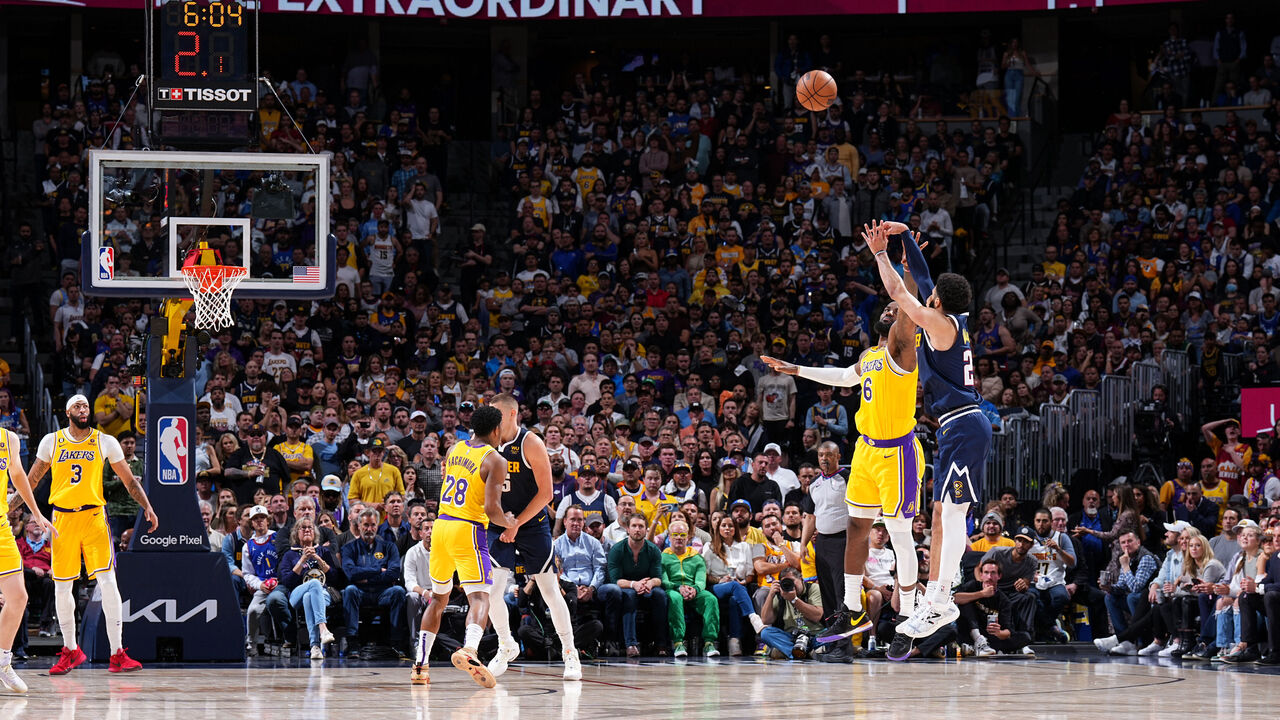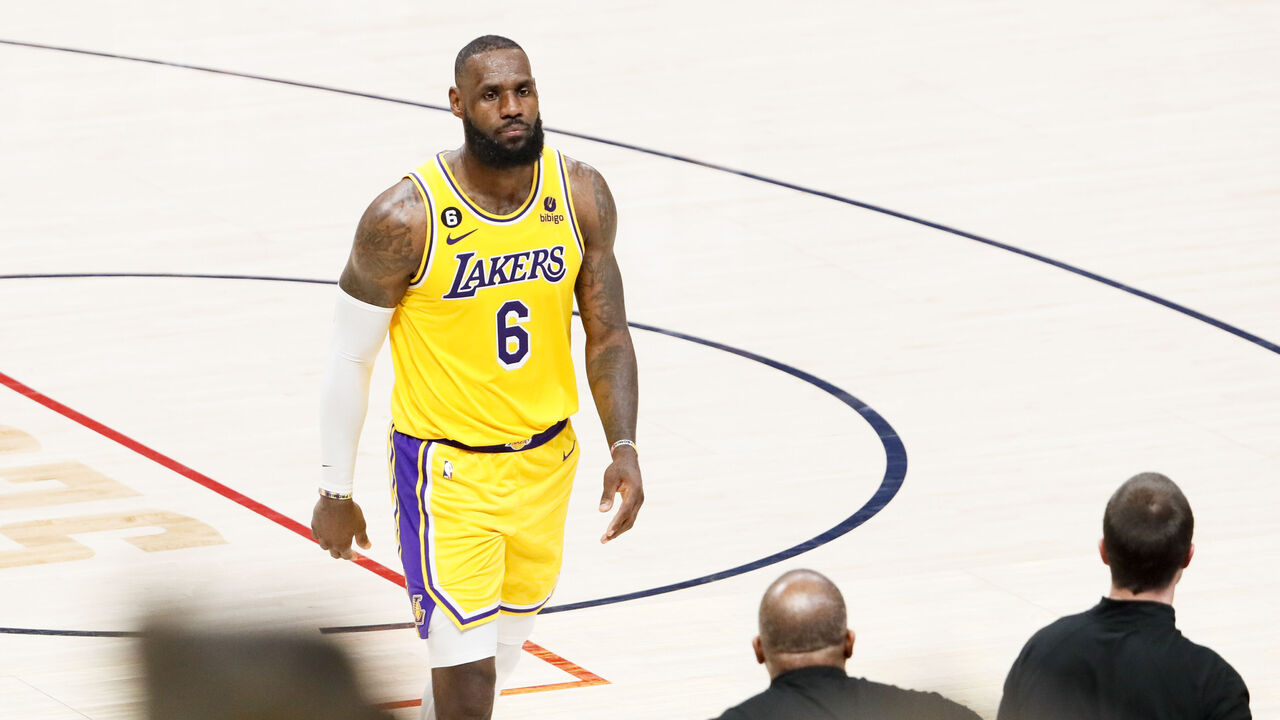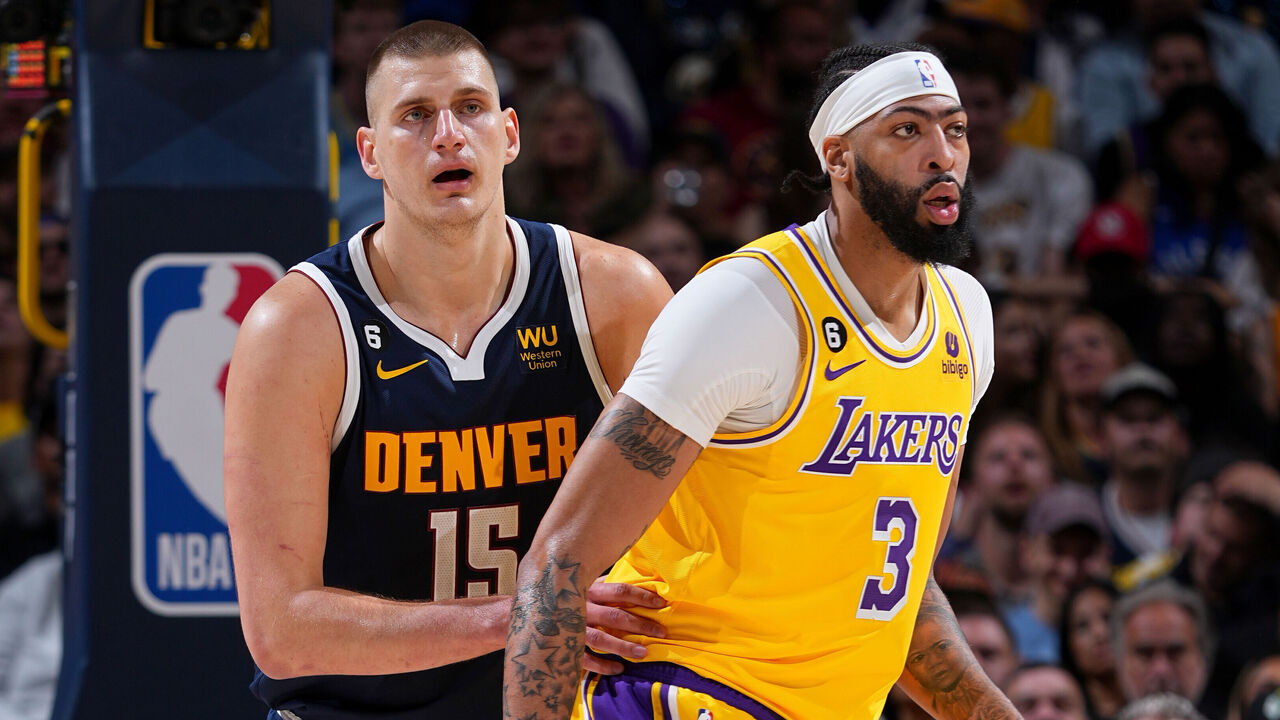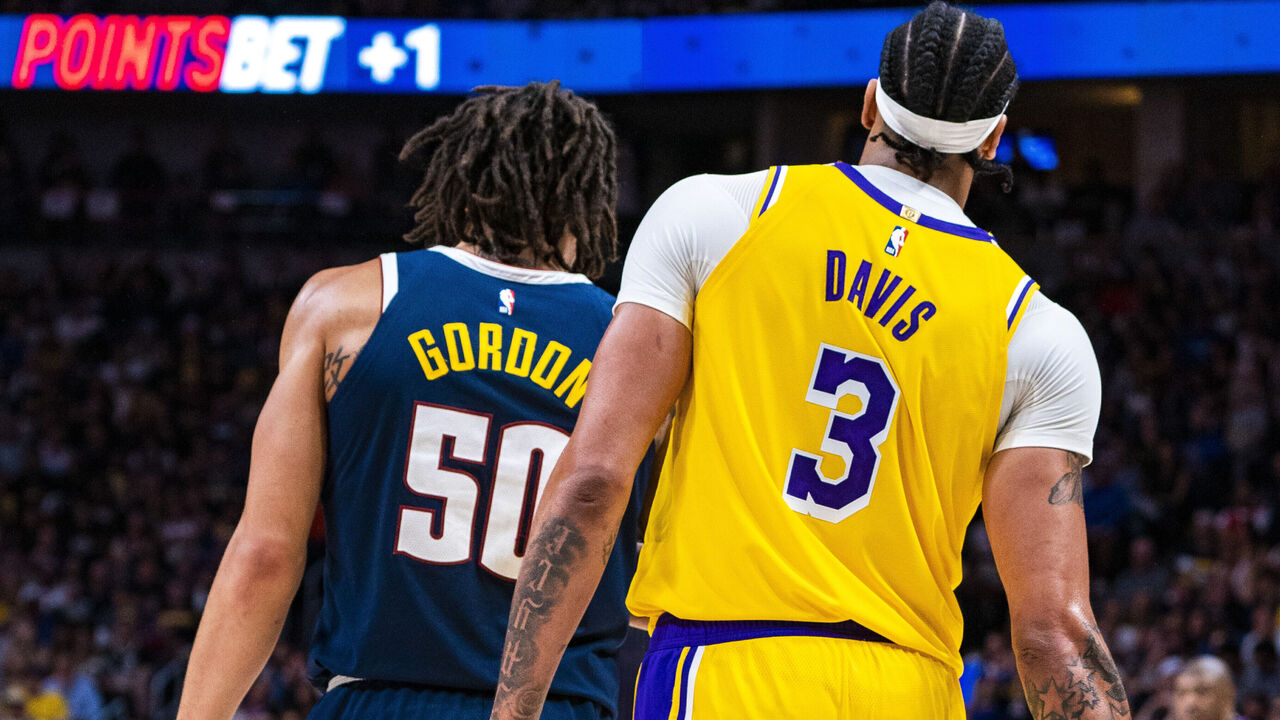Advantage Denver: 5 things to consider as West finals move to L.A.
The Western Conference finals will head to Los Angeles with the top-seeded Denver Nuggets up 2-0 on the Lakers. Here are five observations to consider as the series continues.
Murray's shotmaking the difference

One of the biggest questions facing the Nuggets entering the postseason was whether the team had a championship-level shot-creator and shotmaker beside two-time MVP Nikola Jokic. The answer to that question was always going to hinge on whether Jamal Murray, who missed the last two postseasons recovering from a torn ACL, could repeat his playoff performance from the 2020 bubble.
So far, so good.
Murray has scored 68 points on 52-45-92 shooting through two games of the West finals, with his fourth quarter of Game 2 especially impressive.
Much of the talk between Games 1 and 2 focused on how the Lakers had guarded Jokic in the series opener (specifically, how Rui Hachimura guarded Jokic in the second half), how Los Angeles might start Game 2 because of it, and how Denver would counter. But the story to start Game 2 was that Jarred Vanderbilt returned to the starting lineup to give Los Angeles a new defensive look against Murray.
It paid off, as Vanderbilt hounded Murray the same way he did Steph Curry early in the West semis. Though the offensively challenged Vanderbilt only played 16 minutes and didn't guard Murray for much of the game, his early work on the Canadian guard - plus contributions from other Lakers - helped keep Murray at bay through three quarters.
After scoring 14 points through those first three quarters, Murray then erupted for 23 points in the fourth; more than any Laker scored over the course of the entire game.
Jamal Murray finished with 23 points in the 4th quarter.
— ESPN Stats & Info (@ESPNStatsInfo) May 19, 2023
It was his 4th career 20-point 4th quarter in the playoffs, the most of any player over the last 25 years. pic.twitter.com/x48ubxrtth
Some of that can be attributed to a waning Lakers defense down the stretch, but for the most part, Los Angeles just got beat by a great shotmaker making tough shots. Even more impressively, Murray put together these last two performances while battling an ear infection that had him listed as questionable for Game 1 and noticeably fatigued at various points.
With Jokic, Murray, and a bevy of shooters and cutters around them, the Nuggets' offense is incredibly tough to stop. Trying to defend them while being buried by an avalanche of buckets in Denver's thin air must feel hopeless.
LeBron showing (subtle) signs of age

The level LeBron James has played at this season remains ridiculous for a 38-year-old with more than 65,000 NBA minutes under his belt. James is still capable of summoning even more at times, as he did in a Game 1 loss just a few nights ago. But the league's all-time leading scorer can't dominate every minute he's on the floor anymore.
It didn't cost the Lakers in a first-round victory over the Memphis Grizzlies, when Austin Reaves carried the team home in a Game 1 win, for example. It didn't cost L.A. in a second-round upset of the defending champion Golden State Warriors, when James struggled to score over Steph Curry in the post. But James' offensive drop-off might prove to be too much for the Lakers to overcome against the West-leading Nuggets.
To be fair, James dished out 10 assists in Game 2 after recording nine in the series opener, and his defense was excellent, particularly when matched up with Jokic (LeBron finished Game 2 with four steals and two blocks). But his shot selection in the second half was a microcosm of his age-related limitations.
Despite struggling with his range all night, James attempted and missed four consecutive 3-pointers over the span of 4:41 between the end of the third quarter and the early portion of the fourth. The last of those bricks, in particular, stood out. With the ball in his hands on the perimeter, the Lakers down one, Nuggets forward Jeff Green guarding him, and Bruce Brown and Michael Porter Jr. serving as potential helpers, the stage appeared set for a vintage James drive.
The old LeBron would've barreled his way to the rim, run over anyone in his path, and either slammed it home or at least drawn a foul. Instead, James used the space created by an Anthony Davis screen to launch another 3-pointer despite having missed his first five attempts from deep. Davis' screen didn't even make much of a difference, because Green was already playing well off of James, daring him to shoot. James took the bait, which was a win for Denver's defense.
James, who rolled his left ankle late in the game, went 9-of-13 in the paint, with many of those coming in the restricted area. The story of his game on the offensive end was the times he didn't - or couldn't - get there, though.
The Lakers' midseason turnaround and run to the conference finals has been more about the vastly improved team around James and Davis than it has been about James needing to stand on his head the way he did in postseasons past. But if the Lakers are going to get past Denver and advance to the Finals, let alone win the championship, they'll need LeBron to be better.
No one's better than Jokic

Jimmy Butler and eliminated stars like Giannis Antetokounmpo might disagree, but Jokic continues to show that he's the best player on the planet right now.
After pouring in 34 points (on 70% shooting), 21 rebounds, 14 assists, and two blocks in Game 1, Jokic battled through a rougher individual offensive game Thursday. The big man shot 9-of-21 from the field and needed 23 shooting possessions to score his 23 points, but he also added another 12 assists, grabbed 17 rebounds (including four offensive boards), and recorded three steals in 42 minutes of action.
Perhaps most impressive of all, Jokic played tremendous defense on Davis (though the Lakers star also couldn't make the Nuggets pay with Jokic in drop coverage). That might not have captured the average fan's attention the way Jokic's usual eye-popping numbers did, but his teammates noticed.
Michael Porter Jr. says Nikola Jokić got the Defensive Player of the Game chain tonight and said he deserved it with his defense on Anthony Davis tonight.
— Ryan Blackburn (@NBABlackburn) May 19, 2023
Jokic's pick-and-roll defense has been exposed at times, and he's far from a fearsome rim-protector, but his defensive limitations have also been overblown. He's got good instincts, great hands, and he's tough to move at 284 pounds.
Jokic's excellence was more understated in Game 2 than it was in Game 1, but a "quiet" game still had the Joker producing one point per shooting possession, leading both teams in rebounds and assists, and admirably guarding one of the best big men alive. Not bad.
Good luck beating this guy's team four out of seven, let alone four out of five, as the Lakers now need to do.
Moving AD

A big part of the reason the Lakers found some defensive success with Hachimura on Jokic in the second half of Game 1 was that Aaron Gordon was stationed in the dunker spot. Davis guarding Gordon rather than Jokic allowed the Lakers' best rim-protector to stay in prime help position. The obvious counter for Denver was to involve Gordon in more screening actions and get Davis moving the way the Warriors forced him to do in their second-round series.
Though they're headed to L.A. up 2-0, it still feels like the Nuggets can do more in this regard.
Davis once again started on Jokic, but he guarded Gordon plenty when James or Hachimura was on the Serbian, and Gordon made sure to avoid parking himself on the baseline. The Nuggets also made a more conscious effort to use Gordon as an off-ball screener more than they did in Game 2, with Denver's shooters and cutters using his screens to get open. Still, there's more for the Nuggets to explore. They can use Gordon as an on-ball screener for Jokic or for shooters like Murray and Porter more often. They can even have him initiate the offense more.
To be clear, Davis is dynamic and mobile enough to make a defensive difference regardless, but pulling him away from the rim, forcing him to make decisions in space, and generally making him cover more ground will lessen his impact on that end. Gordon and the Nuggets should do more of it.
The Lakers' math problem
The Lakers' shooting woes aren't exclusive to the conference finals. Even after trading for marksmen like D'Angelo Russell and Malik Beasley, L.A. remained 20th in 3-pointers made per 100 possessions and 18th in 3-point percentage while putting together the West's best post-deadline record. In the second round against the Warriors, the Lakers won a game despite being outscored by 45 points from behind the arc.
But the Nuggets aren't the Warriors. The Lakers survived what appeared to be a mathematical disadvantage against Golden State because they're a dominant interior team that gets to the free-throw line, while the Warriors are far more jumper-reliant. The Nuggets, on the other hand, are a great shooting team that won't be outdone by the Lakers inside the arc the way the Warriors were. With Jokic leading the way, more than 37% of Denver's field-goal attempts came at the rim during the regular season - good for sixth overall - according to Cleaning the Glass.
In addition, while the Warriors were the league's most free-throw-averse team and gave up the eighth-highest free-throw attempt rate on the other end, the Nuggets got to the line more and were the 10th-best team at limiting opponents' free-throw attempts. The Lakers, who get to the line at an elite rate and defend without fouling on the other end, averaged 11 more points per game from the free-throw line than Golden State did during the second round. Against Denver, that advantage is down to 6.5 per game.
Meanwhile, the Lakers have been outscored by 30 points from deep through two games. Fifteen points per game is a lot to overcome when you don't have the same advantages elsewhere that you usually do.
The Lakers' shooting woes were going to catch up with them at some point. L.A. might not have enough firepower to keep up in this matchup.
Joseph Casciaro is theScore's senior content producer.